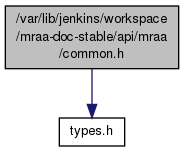|
mraa
0.6.0
Low Level Skeleton Library for Communication on GNU/Linux platforms
|
|
mraa
0.6.0
Low Level Skeleton Library for Communication on GNU/Linux platforms
|
This file defines the basic shared values for libmraa
Go to the source code of this file.
Functions | |
| mraa_result_t | mraa_init () __attribute__((constructor)) |
| void | mraa_deinit () |
| mraa_boolean_t | mraa_pin_mode_test (int pin, mraa_pinmodes_t mode) |
| unsigned int | mraa_adc_raw_bits () |
| unsigned int | mraa_adc_supported_bits () |
| mraa_result_t | mraa_set_log_level (int level) |
| char * | mraa_get_platform_name () |
| int | mraa_set_priority (const unsigned int priority) |
| const char * | mraa_get_version () |
| void | mraa_result_print (mraa_result_t result) |
| mraa_platform_t | mraa_get_platform_type () |
| unsigned int | mraa_get_pin_count () |
Macros | |
| #define | MRAA_PLATFORM_NAME_MAX_SIZE 64 |
Typedefs | |
| typedef unsigned int | mraa_boolean_t |
| mraa_result_t mraa_init | ( | ) | const |
Initialise MRAA
Detects running platform and attempts to use included pinmap
| void mraa_deinit | ( | ) |
De-Initilise MRAA
This is not a strict requirement but useful to test memory leaks and for people who like super clean code. If dynamically loading & unloading libmraa you need to call this before unloading the library.
| mraa_boolean_t mraa_pin_mode_test | ( | int | pin, |
| mraa_pinmodes_t | mode | ||
| ) |
Checks if a pin is able to use the passed in mode.
| pin | Physical Pin to be checked. |
| mode | the mode to be tested. |

| unsigned int mraa_adc_raw_bits | ( | ) |
Check the board's bit size when reading the value

| unsigned int mraa_adc_supported_bits | ( | ) |
Return value that the raw value should be shifted to. Zero if no ADC

| mraa_result_t mraa_set_log_level | ( | int | level | ) |
Sets the log level to use from 0-7 where 7 is very verbose. These are the syslog log levels, see syslog(3) for more information on the levels.

| char* mraa_get_platform_name | ( | ) |
Return the Platform's Name, If no platform detected return NULL

| int mraa_set_priority | ( | const unsigned int | priority | ) |
This function attempts to set the mraa process to a given priority and the scheduler to SCHED_RR. Highest * priority is typically 99 and minimum is 0. This function * will set to MAX if * priority is > MAX. Function will return -1 on failure.
| priority | Value from typically 0 to 99 |

| const char* mraa_get_version | ( | ) |
Get the version string of mraa autogenerated from git tag
The version returned may not be what is expected however it is a reliable number associated with the git tag closest to that version at build time

| void mraa_result_print | ( | mraa_result_t | result | ) |
Print a textual representation of the mraa_result_t
| result | the result to print |

| mraa_platform_t mraa_get_platform_type | ( | ) |
Get platform type, board must be initialised.

| unsigned int mraa_get_pin_count | ( | ) |
Get platform pincount, board must be initialised.

| typedef unsigned int mraa_boolean_t |
MRAA boolean type 1 For TRUE

 1.8.7
1.8.7